The newer flag semaphore system uses two short poles with square flags, which a flagperson holds in different positions to signal letters of the alphabet and numbers. The flagperson holds one pole in each hand, and extends each arm in one of eight possible directions. Except for in the rest position, the flags cannot overlap. The flags are colored differently based on whether the signals are sent by sea or by land. At sea, the flags are colored red and yellow. While on land, they are red and white.
The following semaphore characters are presented as one would face the signalman (in other words, pretend you can see the signalman's face in the illustrations). The letters almost follow a perfect, regular pattern, but don't be fooled by the first several. J, V, and Y break the pattern. We present them here in alphabetical order, and then again by position in a series of circles.
Alphabetic Order
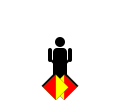 Rest position |
 Numerals |
 Attention |
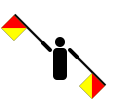 Cancel | ||
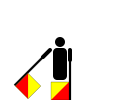 A / 1 |
 B / 2 |
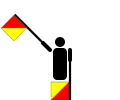 C / 3 / Ack |
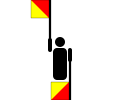 D / 4 |
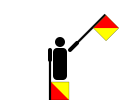 E / 5 / Error 9x's |
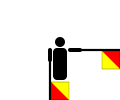 F / 6 |
 G / 7 |
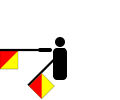 H / 8 |
 I / 9 |
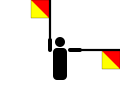 J / Letters |
 K / 0 | |
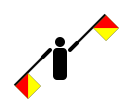 L |
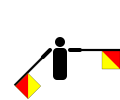 M |
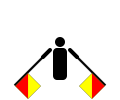 N |
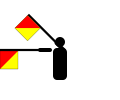 O |
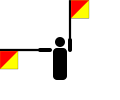 P | |
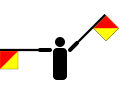 Q |
 R |
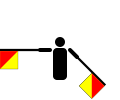 S |
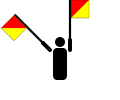 T |
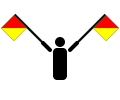 U | |
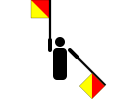 V |
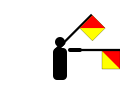 W |
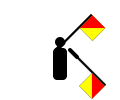 X |
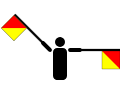 Y |
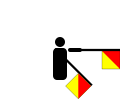 Z |
By position
| The Grand Circle |  A |
 B |
 C |
 D |
 E |
 F |
 G |
| A Circle | 
|
 H |
 I |
 K |
 L |
 M |
 N |
| B Circle | 
|

|
 O |
 P |
 Q |
 R |
 S |
| C Circle | 
|

|

|
 T |
 U |
 Y |
 Cancel |
| D Circle | 
|

|

|

|
 Numerals |
 J |
 V |
| E Circle | 
|

|

|

|

|
 W |
 X |
| F Circle | 
|

|

|

|

|

|
 Z |
Tips
When you are first learning semaphores, a good Bible text to practice with is Philippians 4:8, as it repeats the phrase "whatever is" six times. Since it is so repetitive, You should be able to quickly signal the "whatever is" portion to get your speed up. This verse contains all the letters of the alphabet except j, q, and z which can be learned afterwards.
Finally, brothers, whatever is true, whatever is noble, whatever is right, whatever is pure, whatever is lovely, whatever is admirable—if anything is excellent or praiseworthy—think about such things.
Graphically
 F F
|
 I I
|
 N N
|
 A |
 L L
|
 L L
|
 Y Y
|

|

|

|

|

|

|

|

|
 B B
|
 R R
|
 O O
|
 T T
|
 H H
|
 E E
|
 R R
|
 S S
|

|

|

|

|

|

|

|
 W W
|
 H H
|
 A |
 T T
|
 E E
|
 V V
|
 E E
|
 R R
|

|

|

|

|

|

|

|
 I I
|
 S S
|

|

|

|

|

|

|

|

|

|

|

|

|

|
 T T
|
 R R
|
 U U
|
 E E
|

|

|

|

|

|

|

|

|

|

|

|
 W W
|
 H H
|
 A |
 T T
|
 E E
|
 V V
|
 E E
|
 R R
|

|

|

|

|

|

|

|
 I I
|
 S S
|

|

|

|

|

|

|

|

|

|

|

|

|

|
 N N
|
 O O
|
 B B
|
 L L
|
 E E
|

|

|

|

|

|

|

|

|

|

|
 W W
|
 H H
|
 A |
 T T
|
 E E
|
 V V
|
 E E
|
 R R
|

|

|

|

|

|

|

|
 I I
|
 S S
|

|

|

|

|

|

|

|

|

|

|

|

|

|
 R R
|
 I I
|
 G G
|
 H H
|
 T T
|

|

|

|

|

|

|

|

|

|

|
 W W
|
 H H
|
 A |
 T T
|
 E E
|
 V V
|
 E E
|
 R R
|

|

|

|

|

|

|

|
 I I
|
 S S
|

|

|

|

|

|

|

|

|

|

|

|

|

|
 P P
|
 U U
|
 R R
|
 E E
|

|

|

|

|

|

|

|

|

|

|

|
 W W
|
 H H
|
 A |
 T T
|
 E E
|
 V V
|
 E E
|
 R R
|

|

|

|

|

|

|

|
 I I
|
 S S
|

|

|

|

|

|

|

|

|

|

|

|

|

|
 L L
|
 O O
|
 V V
|
 E E
|
 L L
|
 Y Y
|

|

|

|

|

|

|

|

|

|
 W W
|
 H H
|
 A |
 T T
|
 E E
|
 V V
|
 E E
|
 R R
|

|

|

|

|

|

|

|
 I I
|
 S S
|

|

|

|

|

|

|

|

|

|

|

|

|

|
 A |
 D D
|
 M M
|
 I I
|
 R R
|
 A |
 B B
|
 L L
|
 E E
|

|

|

|

|

|

|
More Tips
Learn some landmark letters first and commit them to memory. Groups of related letters are a good choice. For example, these three make straight lines:
 D D
|
 R R
|
 L L
|

|

|

|

|

|

|

|

|

|

|

|

|
These four are made by holding the flags 90° to one another, but all are at 45° to the signaler:
 U U
|
 N N
|
 I I
|
 X X
|

|

|

|

|

|

|

|

|

|

|

|
These four are made by holding the flags 45° apart:
 A |
 H H
|
 O O
|
 T T
|

|

|

|

|

|

|

|

|

|

|

|
Most of these are fairly common letters (except for X), so knowing them will allow you to spell the better part of most words. Add an A and an S to the mix:
 A |
 S S
|

|

|

|

|

|

|

|

|

|

|

|

|

|
and you can spell a quick sentence:
 U U
|
 N N
|
 I I
|
 X X
|
 Rest Rest
|
 I I
|
 S S
|
 Rest Rest
|

|

|

|

|

|

|

|
 A |
 Rest Rest
|
 H H
|
 O O
|
 T T
|
 R R
|
 O O
|
 D D
|
 Rest Rest
|
 O O
|
 S S
|
 Rest Rest
|

|

|

|
